|
|
|
Sort Order |
|
|
|
Items / Page
|
|
|
|
|
|
|
| Srl | Item |
| 1 |
ID:
105679
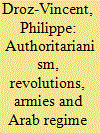

|
|
|
|
|
| Publication |
2011.
|
| Summary/Abstract |
Authoritarianism in the Arab world has had a propensity to endure for decades and was seen as an essential political feature in a region where democratisation was said to flounder. Yet, authoritarian regimes are exhausted and weakened. It took massive social mobilisation in 2011 in Tunisia and Egypt to topple them. Those societies have gained an essential voice in the political process with an aspiration for democracy. Transition was about to open up to chaos and then a specific actor, the military, stepped in to smooth the transition. The next step in Tunisia and Egypt is the delicate rebuilding of governments to fulfill this aspiration for democracy as well as to provide a demonstration effect for the new model of transition throughout the Arab world.
|
|
|
|
|
|
|
|
|
|
|
|
|
|
|
|
| 2 |
ID:
159361
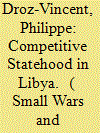

|
|
|
|
|
| Summary/Abstract |
Libya in 2011 witnessed a real process of political change, though different from all the policy-oriented jargon equating transition with a teleological transition to democracy. Due to the resilience of the Qadhafi regime in power and with the essential role of NATO intervention, the process was eased out by a eight-month civil war. Governance in post-Qadhafi Libya was not done through the rebuilding of centralized authorities. But it took the specific form of the emergence of multiple non-state actors embedded in local dynamics and then connected with weakened central authorities that had access to the huge Libyan resources. That raised complex questions about the quality of this mode of governance, especially at a time of pressing problems for Libya and its neighbors, whether direct ones (Tunisia, Egypt, Mali) or farther countries across the Mediterranean sea: terrorism with the expansion of Da’esh into the country and flows of refugees crossing Libya’s uncontrolled borders and flowing into Italy and then Europe by thousands.
|
|
|
|
|
|
|
|
|
|
|
|
|
|
|
|
| 3 |
ID:
135997
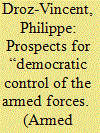

|
|
|
|
|
| Summary/Abstract |
A clear breach of authoritarian rule within the Arab world in 2012 manifested in public uprisings among significant sectors of society. As a relatively autonomous institution within the authoritarian system of rule, the military played an essential role. In many cases, the militaries in the Arab world aligned themselves with resilient protestors or fractured, thereby easing the end of the authoritarian status quo. Though the end result is still undecided with unprecedented changes in the making, future relations between civilians and armies will be a critical factor. After authoritarian regimes collapsed but before democratic regimes are strongly established, new civilian leaders struggle to diminish the military’s ability to directly determine the course of events. This article also draws on theoretical reflections and experiences from earlier transitions to democracy witnessed in Latin America, Southern Europe, and Eastern Europe, in order to provide a reliable map of ways the Arab world might travel, as well as the tools for diagnosing the situation. Finally, this article reflects on what may be necessary to establish democratic civil–military relations in a moving Arab world.
|
|
|
|
|
|
|
|
|
|
|
|
|
|
|
|
| 4 |
ID:
176552
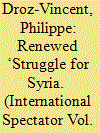

|
|
|
|
|
| Summary/Abstract |
Syria is generally considered a case of non-intervention. One of the dominant (since the 1990s) kinds of intervention, namely multilateral humanitarian intervention, failed, as did other attempts by a select group of countries to implement a ‘red line’ concerning the use of chemical weapons. However, in this case, there is no sharp dichotomy between intervention and non-intervention. In lieu of an intervention that would tilt the balance and coordinate help to halt massacres, various rival and uncoordinated international and regional interventions overlapped over time, fuelling a market for violence. ‘Weakened interventionism’, as opposed to principled and hierarchical intervention, has manifested itself in Syria in a model recalling “the struggle for Syria” of the 1960s in a new, contemporary setting.
|
|
|
|
|
|
|
|
|
|
|
|
|
|
|
|
| 5 |
ID:
127510
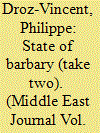

|
|
|
|
|
| Publication |
2014.
|
| Summary/Abstract |
Unlike the Tunisian and Egyptian uprisings in 2011, the Syrian Revolution has endured for more than three years. The uprising burst from the "peripheries" of the regime into an organized national movement, clinging at the beginning to the ideal of a nonviolent, nonsectarian upheaval aiming at a democratic Syria. Yet, the dynamics of contention between the regime and social movements have been reshaped, leading to a return of violence with the risks of sectarian civil war looming.
|
|
|
|
|
|
|
|
|
|
|
|
|
|
|
|
|
|
|
|
|